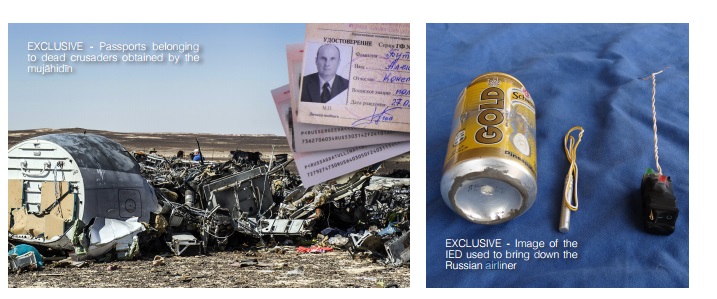Latest NEWS
- Aswat Masriya, the last word
- Roundup of Egypt's press headlines on March 15, 2017
- Roundup of Egypt's press headlines on March 14, 2017
- Former Egyptian President Hosni Mubarak to be released: lawyer
- Roundup of Egypt's press headlines on March 13, 2017
- Egypt's capital set to grow by half a million in 2017
- Egypt's wheat reserves to double with start of harvest -supply min
- Roundup of Egypt's press headlines on March 12, 2017
ISIS claims explosive device was in fizzy drink can

Images released by ISIS magazine Dabiq released online purporting to show the explosive device used to bring down the Russian plane in Egypt Sinai, on Oct. 18, 2015. Snapshot from magazine
CAIRO, Nov. 18 (Aswat Masriya) - Reiterating a strong sentiment against the "crusaders", the Islamic State Fighters in Iraq and Syria published on Wednesday an image of what it alleges to be the improvised explosive device (IED) used to bring down a Russian plane in Egypt's Sinai last month.
In a 66-page long issue of the ISIS rag called Dabiq, the group showed two images related to the crash, one of passports purportedly belonging to some of the 224 passengers, mostly Russian holiday makers, killed in the crash. The other is of a fizzy drink can with the caption "EXCLUSIVE - Image of the IED used to bring down the Russian airliner."
Photographed next to the Schweppes Gold can, are two wire and cord formations that appear to make up the makeshift trigger of the alleged device.
The publication comes a day after the Kremlin said the plane was taken down by a "terrorist act" and that a Russian investigation concluded that "a self-made explosive device equivalent up to 1 kg of TNT was set off on board."
The magazine said it discovered a way to "compromise" security at the Sharm El-Sheikh airport and initially planned to down a plane belonging to a country in the U.S.-led coalition against ISIS. The magazine does not name the country, the coalition includes more than 60 countries.
It adds that a "bomb was smuggled onto the airplane, leading to the deaths of 219 Russians and five other crusaders only a month after Russia’s thoughtless decision."
Five of the plane's passengers are in fact not Russian. Four were from the Ukraine and one person was from Belarus. However, according to the Russian government's list of the passengers, the nationalities of three are unknown.
Aswat Masriya could not independently verify the images or the group's claims.
Neither Egypt nor Russia have officially commented on these images so far.
ISIS's affiliate group in Egypt, Sinai Province which pledged allegiance to it in November 2014, has claimed responsibility for the downing of the Russian plane twice.
The claim was initially dismissed but the second one, made through an audio recording was eventually taken seriously after major Western powers officially supported the idea that it was possible that the Russian plane was brought down by a bomb, including the U.S. and the UK.
"We, thanks to Allah, are the ones who brought it down and we are not obliged to reveal the mechanism," the group said in the audio recording on Nov. 4.
Russia announced today the "intensification" of Russian operations in Syria, to include long-range aviation and naval units. Russia launched strikes against ISIS in Syria in September, a decision that was heavily criticised by the West and several Gulf states who believed Russia was not striking enough ISIS targets.
U.S. state department deputy spokesman Mark Toner said the U.S. wants "any airstrikes taken by Russian assets in Syria (a) to be directed at ISIL, and (b) to take into consideration possible civilian casualties," in a press briefing on Tuesday.
Militancy inside Egypt has seen a significant rise since the military ouster of Islamist President Mohamed Mursi in July 2013, following mass protests against his rule.
North Sinai is at the epicentre of the insurgency and most attacks target security forces there, with ISIS's affilaite group being one of the most active militant groups in it.
But on an international scale, ISIS has been on a rampage in recent weeks, claiming responsibility for three attacks in the past month alone that have killed hundreds of civilians, including the deadly Paris attacks on Friday night.
The group has repeatedly featured the word "crusaders" in statements and today's issue of Dabiq magazine says, "thus, the blessed attacks against the Russians and the French were successfully executed despite the international intelligence war ... Both crusader nations had undoubtedly destroyed their homes with their own hands."










